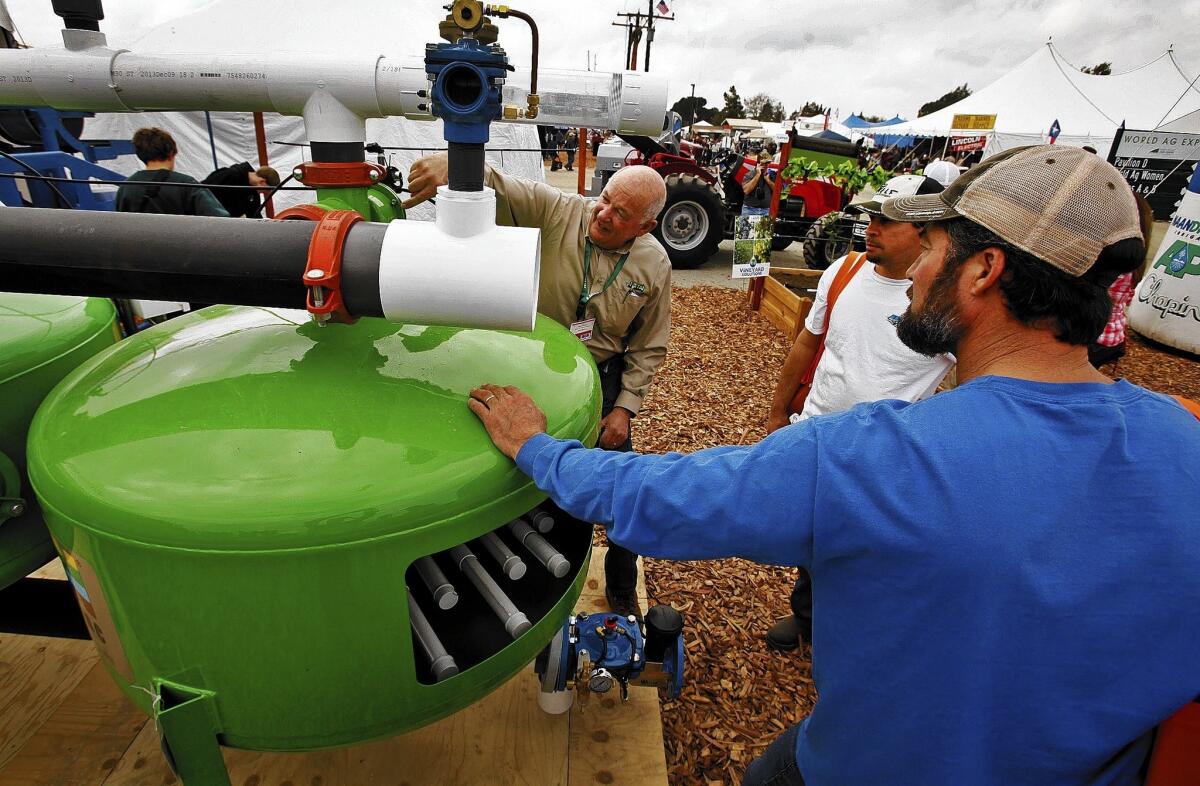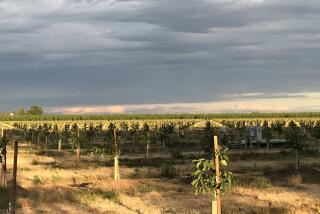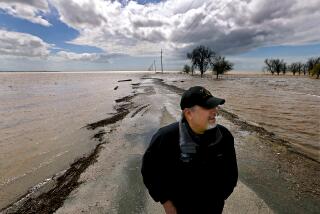Drought may be a fertile topic for GOP candidates

TULARE, Calif.— Signs reading “No Water = No Jobs” line the alfalfa fields and almond orchards along the highway that bisects this region. The weekly “Ag Alert” newsletter records worries about tomato and grape crops, and drought turning dairy pastures brown.
Water, or the lack of it, is on everyone’s minds here in the Central Valley, stretching from Bakersfield past Sacramento and home of the state’s $45-billion-a-year agriculture industry. Republican candidates for governor are seizing on the subject as they seek to score political points against the popular Democratic incumbent, Gov. Jerry Brown.
On Wednesday, visiting a global agriculture fair here that drew tens of thousands of people, Neel Kashkari assailed Brown for a lack of leadership on the issue. Challenger Tim Donnelly a state assemblyman, has been hopscotching the state on a bus tour, calling the drought a “government-created Dust Bowl.”
Though neither has detailed proposals for easing the drought, both are hoping it will help them tap support in one of the most Republican parts of the state, one where Brown struggled in the 2010 election.
The odds of keeping Brown from an unprecedented fourth and final term are widely considered daunting, but Brown’s opponents could benefit if the drought worsens and voters must grapple with water rationing, higher food prices and other tangible effects.
“Water is ideology in the Valley, and politicians have won and lost races over water,” said Republican strategist Rob Stutzman, who advised former Gov. Arnold Schwarzenegger and 2010 GOP gubernatorial nominee Meg Whitman.
But Stutzman said it was too early to know how potent the drought issue might become: “To date, water still comes out of faucets.”
But Brown is clearly paying attention, stepping up his trips to the Central Valley in recent weeks and going to the World Ag Expo for the first time in three decades.
He is due back in the region Friday to tour drought-ravaged land with President Obama, reflecting the attention the problem is receiving even in Washington. Drought response is being debated in Congress, and Republicans are raising the issue in tight House races.
Brown has declared a drought emergency, curtailed state water use and urged Californians to cut consumption by a fifth, posting highway billboards asking for conservation. He is lobbying Washington to ease federal restrictions on water transfers and has proposed a massive tunnel system to move water from Northern California to the south.
That’s not adequate, said Kashkari, who accused Brown of failing to gird California for the inevitable.
“We know that droughts happen and … we’re totally unprepared,” Kashkari, who lives in Laguna Beach, said before touring the expo, a sprawling event with 45 football fields’ worth of exhibits. “It’s a lack of leadership in Sacramento that’s the reason we’re unprepared.”
The former U.S. Treasury official proposes more water storage, above and below ground. Kashkari says he wants to study all potential methods of moving water but is concerned about the cost of tunnels.
Donnelly, who represents an Inland Empire Assembly district in the Legislature, flatly blames Brown for the region’s woes.
“Our way of life is under assault by government,” the tea party favorite said in Lodi on Tuesday. “Jerry Brown’s water policies are turning rural counties into welfare counties.”
It’s a message that resonates in a region where Brown won only three of 19 counties in 2010 and where unemployment is higher than in coastal and large urban areas, in which Brown fared much better. Jobless rates in most valley counties remain in double digits, even as the statewide number has fallen to 8.3%.
Bob “Rocket” Borba, a Republican dairy farmer from Modesto, said that for the first time in years, he could not predict how much milk his cows would produce because he wasn’t sure how much feed he could grow.
“Our water storage system is not adequate for our population,” Borba said. “Why is that? Why are we working on these [high-speed] trains and these other projects and starving our farmers?”
Donnelly says federal environmental policies waste water to save smelt by diverting flows that should go to Central Valley farmland.
“We need to turn on those pumps,” he told a Sacramento-area gathering last week. “If that means a little tiny minnow gets ground up on the way out, we ought to spread it on the fields like fertilizer.”
He calls for a canal network to move water around, saying Brown’s plan for tunneling under wetlands “is a recipe for massive cost overruns and potential catastrophic failure, putting our entire water supply at risk.”
State lawmakers have been negotiating a bond measure for the November ballot to pay for more reservoirs and to help clean the state’s drinking water, among other provisions. Brown has not yet stated his position on the measure.
Asking voters to put billions more on the state credit card doesn’t square with the governor’s fealty to fiscal discipline — a trait many voters say they admire. But the option could prove more attractive if the drought grows significantly worse.
At the expo on Wednesday, Brown was dismissive of his critics, reminding reporters that he cannot control the weather: “When God doesn’t provide the water, it’s not here.”
Without offering any new details on how to ease the water crisis, the governor expressed confidence that he would find a solution.
“If anybody can get it done, I can get it done,” the governor said, “and I’m working night and day to achieve it.”
He said people think differently about water in different areas of the state, and “I try to bring everybody together, and at this stage in my life, I think I’m going to be able to do that.”
Some voters at the expo this week cut Brown some slack on the drought issue, giving him points for balancing the budget.
Andrew Genasci, a Republican and a field representative for the Farm Bureau, voted for Whitman in 2010, partly because of his parents’ stories about Brown as “Gov. Moonbeam” of the 1970s. Genasci said he had been pleasantly surprised by the incumbent’s “common-sense outlook.”
“Gov. Brown has been good on a lot of ag issues,” Genasci said, and “I like what he’s done with the state’s budget, at least getting it flattened out.”
He did not blame Brown for water problems, which he says cross party lines and go back decades.
Most officials, he said, have “avoided the fight and kicked the can down the road.”
More to Read
Start your day right
Sign up for Essential California for news, features and recommendations from the L.A. Times and beyond in your inbox six days a week.
You may occasionally receive promotional content from the Los Angeles Times.







